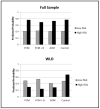Moderation of a parent-based intervention on transitions in drinking: examining the role of normative perceptions and attitudes among high- and low-risk first-year college students
- PMID: 23551037
- PMCID: PMC3706579
- DOI: 10.1111/acer.12126
Moderation of a parent-based intervention on transitions in drinking: examining the role of normative perceptions and attitudes among high- and low-risk first-year college students
Abstract
Background: Parent-based interventions (PBIs) are an effective strategy to reduce problematic drinking among first-year college students. The current study examined the extent to which student-based characteristics, derived from the Theory of Planned Behavior, moderated 3 PBI conditions: (i) prior to college matriculation (PCM); (ii) PCM with a booster during the fall semester; and (iii) after college matriculation. The moderator variables included injunctive and descriptive peer norms about alcohol use and attitudes toward alcohol use.
Methods: Using data from a randomized control trial delivered to 1,900 incoming college students, we examined differential treatment effects within 4 types of baseline student drinkers: (i) nondrinkers; (ii) weekend light drinkers (WLD); (iii) weekend heavy episodic drinkers; and (iv) heavy drinkers. The outcome variable was based on the transitions in drinking that occurred between the summer prior to college enrollment and the end of the first fall semester and distinguished between students who transitioned to 1 of the 2 risky drinking classes.
Results: The results indicated that injunctive norms (but not descriptive norms or attitudes) moderated the differential effects of the PBI with strongest effects for students whose parents received the booster. Differential effects also depended on baseline drinking class and were most pronounced among WLDs who were deemed "high-risk" in terms of injunctive peer norms.
Conclusions: Parental influence can remain strong for young adults who are transitioning to college environments, even among students with relatively high peer influence to drink alcohol. Thus, the PBI represents an effective tool to prevent escalation of alcohol use during the first year of college, when risk is highest and patterns of alcohol use are established.
Keywords: Alcohol Attitudes; College Student Alcohol Use; Differential Treatment Effects; Normative Beliefs; Theory of Planned Behavior.
Copyright © 2013 by the Research Society on Alcoholism.
Figures
Similar articles
-
Evaluation of timing and dosage of a parent-based intervention to minimize college students' alcohol consumption.J Stud Alcohol Drugs. 2013 Jan;74(1):30-40. doi: 10.15288/jsad.2013.74.30. J Stud Alcohol Drugs. 2013. PMID: 23200148 Free PMC article. Clinical Trial.
-
Transitions in first-year college student drinking behaviors: does pre-college drinking moderate the effects of parent- and peer-based intervention components?Psychol Addict Behav. 2012 Sep;26(3):440-50. doi: 10.1037/a0026130. Epub 2011 Nov 7. Psychol Addict Behav. 2012. PMID: 22061340 Free PMC article. Clinical Trial.
-
Transitions in drinking behaviors across the college years: A latent transition analysis.Addict Behav. 2019 May;92:108-114. doi: 10.1016/j.addbeh.2018.12.021. Epub 2018 Dec 19. Addict Behav. 2019. PMID: 30611066 Free PMC article.
-
Response of colleges to risky drinking college students.R I Med J (2013). 2014 Oct 1;97(10):40-2. R I Med J (2013). 2014. PMID: 25271660 Free PMC article. Review.
-
Peer-led interventions to reduce alcohol consumption in college students: A scoping review.Health Soc Care Community. 2022 Nov;30(6):e3562-e3578. doi: 10.1111/hsc.13990. Epub 2022 Sep 4. Health Soc Care Community. 2022. PMID: 36057959 Free PMC article.
Cited by
-
Using latent transition analysis to compare effects of residency status on alcohol-related consequences during the first two years of college.Addict Behav. 2018 Dec;87:276-282. doi: 10.1016/j.addbeh.2018.06.002. Epub 2018 Jun 8. Addict Behav. 2018. PMID: 30146040 Free PMC article.
-
Who Will Experience the Most Alcohol Problems in College? The Roles of Middle and High School Drinking Tendencies.Alcohol Clin Exp Res. 2015 Oct;39(10):2039-46. doi: 10.1111/acer.12846. Epub 2015 Sep 7. Alcohol Clin Exp Res. 2015. PMID: 26344051 Free PMC article.
-
Social Anxiety and Cannabis-Related Impairment: The Synergistic Influences of Peer and Parent Descriptive and Injunctive Normative Perceptions.Subst Use Misuse. 2016 Jun 6;51(7):912-21. doi: 10.3109/10826084.2016.1156701. Epub 2016 May 4. Subst Use Misuse. 2016. PMID: 27144526 Free PMC article.
-
Latent Class Analysis of DSM-5 Alcohol Use Disorder Criteria Among Heavy-Drinking College Students.J Subst Abuse Treat. 2015 Oct;57:81-8. doi: 10.1016/j.jsat.2015.05.006. Epub 2015 May 16. J Subst Abuse Treat. 2015. PMID: 26051027 Free PMC article.
-
An Examination of the Relationship Between Consequence-Specific Normative Belief Patterns and Alcohol-Related Consequences Among College Students.Alcohol Clin Exp Res. 2016 Dec;40(12):2631-2638. doi: 10.1111/acer.13242. Epub 2016 Nov 2. Alcohol Clin Exp Res. 2016. PMID: 27805274 Free PMC article.
References
-
- Ajzen I. The theory of planned behavior. Organ Behav Hum Decis Process. 1991;50:179–211.
-
- Baer JS, Stacy A, Larimer M. Biases in the perception of drinking norms among college students. J Stud Alcohol. 1991;52:580–586. (1991) - PubMed
-
- Baer JS. Effects of college residence on perceived norms for alcohol consumption: An examination of the first year in college. Psych of Addict Behav. 1994;8:43–50.
-
- Blanton H, Köblitz A, McCaul KD. Misperceptions about norm misperceptions: Descriptive, injunctive, and affective ‘Social Norming’ efforts to change health behaviors. Soc Person Psych Compass. 2008;2/3:1379–1399.
Publication types
MeSH terms
Grants and funding
LinkOut - more resources
Full Text Sources
Other Literature Sources
Medical


